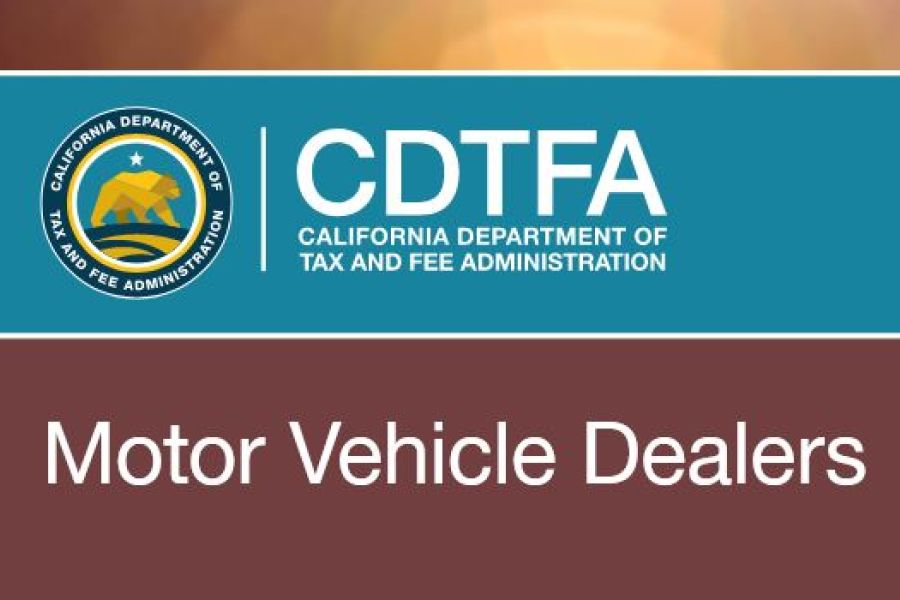The California Department of Tax and Fee Administration (CDTFA) has updated Publication 34 (Motor Vehicle Dealers), to include 2020 legislation that, effective 1/1/2021, imposes new reporting and payments requirements on certain used vehicle dealers. The new discussion, entitled "Used Vehicle Dealers" (in the section on "Motor Vehicle Sales"), provides in part that effective 1/1/2021, certain used vehicle dealers are required to pay sales tax on their retail sales of vehicles when a vehicle registration application is submitted to the Department of Motor Vehicles (DMV). The CDTFA previously discussed these changes in California Department of Tax and Fee Administration Special Notice L-766, 11/01/2020. The CDTFA also made a number of nonsubstantive changes to the publication. Publication 34 is designed to help motor vehicle dealers understand California’s sales and...

When Anna, the CEO of a small manufacturing company, received an anonymous report about fraud in the accounting department, she wasn’t sure how to act. After all, the complaint could be accurate, but there was also a chance that it wasn’t. She called her company’s attorney, who recommended a forensic accountant to investigate. He also suggested that she perform some preliminary interviews to gather facts — but to be careful not to interrogate employees. If you’re in a position similar to Anna’s, here’s how to conduct interviews before a fraud expert comes on the case. Investigation prep In advance of requesting any interviews, decide what information you’re looking for. Knowing what you want helps you get to the truth of the matter quickly and avoid getting sidetracked by...
If you have a life insurance policy, you may want to ensure that the benefits your family will receive after your death won’t be included in your estate. That way, the benefits won’t be subject to federal estate tax. Current exemption amounts For 2021, the federal estate and gift tax exemption is $11.7 million ($23.4 million for married couples). That’s generous by historical standards but in 2026, the exemption is set to fall to about $6 million ($12 million for married couples) after inflation adjustments — unless Congress changes the law. In or out of your estate Under the estate tax rules, insurance on your life will be included in your taxable estate if: Your estate is the beneficiary of the insurance proceeds, or You possessed certain economic ownership...
(This is Blog Post #1006)...
Are you thinking about buying or replacing a vehicle that you’ll use in your business? If you consider a heavy SUV, you may be able to benefit from lucrative tax rules for those vehicles. Bonus depreciation Under current law, 100% first-year bonus depreciation is available for qualified new and used property that’s acquired and placed in service in a calendar year. New and pre-owned heavy SUVs, pickups and vans acquired and put to business use in 2021 are eligible for 100% first-year bonus depreciation. The only requirement is that you must use the vehicle more than 50% for business. If your business usage is between 51% and 99%, you can deduct that percentage of the cost in the first year the vehicle is placed in service. This...
Dividing a marital estate is rarely easy. But it’s made much harder if a divorcing spouse owns a private business and attempts to artificially deflate its profits or hide assets. If you or your attorney suspects this type of deception, engage a forensic accountant to investigate. Key questions When working on divorce cases, fraud experts ask several questions about private business interests. For example, does a spouse own a cash business that may have unreported income? Does the owner receive special (or excessive) perks or tax write-offs that affect the business’s profitability? Are numbers intentionally reported incorrectly to affect the business’s value? n addition, experts investigate whether the company has any subsidiaries or is part of any other business ventures. Sometimes, a business owner may be a silent...
Are you thinking about launching a business with some partners and wondering what type of entity to form? An S corporation may be the most suitable form of business for your new venture. Here’s an explanation of the reasons why. The biggest advantage of an S corporation over a partnership is that as S corporation shareholders, you won’t be personally liable for corporate debts. In order to receive this protection, it’s important that the corporation be adequately financed, that the existence of the corporation as a separate entity be maintained and that various formalities required by your state be observed (for example, filing articles of incorporation, adopting by-laws, electing a board of directors and holding organizational meetings). Anticipating losses If you expect that the business will incur losses...
All that glitters isn’t gold. This includes gold — and other precious metals, stones and jewels that are sometimes used to launder the “dirty” proceeds of criminal activities such as drug trafficking and terrorism. But several U.S. laws and regulations target these international money-laundering operations. Good as gold Precious metals, stones and jewels make ideal vehicles for money laundering for several reasons: Ownership and control. Precious metals are bearer instruments, meaning that like cash, the individual in possession of the precious metal owns and controls it. Readily transferable. There’s an active, global market that enables criminals to trade them. Because precious metals have many legitimate uses, criminals often can move them without attracting attention. Relatively stable. Although the price of precious metals fluctuates like those of any commodity, the value...
The U.S. Department of Labor (DOL) recently issued EBSA Disaster Relief Notice 2021-01, which is of interest to employers. It clarifies the duration of certain COVID-related deadline extensions that apply to health care benefits plans. Extensions to continue The DOL and IRS issued guidance last year specifying that the COVID-19 outbreak period — defined as beginning March 1, 2020, and ending 60 days after the announced end of the COVID-19 national emergency — should be disregarded when calculating various deadlines under COBRA, ERISA and HIPAA’s special enrollment provisions. The original emergency declaration would have expired on March 1, 2021, but it was recently extended. Although the agencies defined the outbreak period solely by reference to the COVID-19 national emergency, they relied on statutes allowing them to specify disregarded periods for a...
April 15 is the deadline for the first quarterly estimated tax payment for 2021, if you’re required to make one. You may have to make estimated tax payments if you receive interest, dividends, alimony, self-employment income, capital gains, prize money or other income. If you don’t pay enough tax during the year through withholding and estimated payments, you may be liable for a tax penalty on top of the tax that’s ultimately due. Four due dates Individuals must pay 25% of their “required annual payment” by April 15, June 15, September 15, and January 15 of the following year, to avoid an underpayment penalty. If one of those dates falls on a weekend or holiday, the payment is due on the next business day. The required annual payment for...
- 1
- 2
- 3
- 4
- 5
- 6
- 7
- 8
- 9
- 10
- 11
- 12
- 13
- 14
- 15
- 16
- 17
- 18
- 19
- 20
- 21
- 22
- 23
- 24
- 25
- 26
- 27
- 28
- 29
- 30
- 31
- 32
- 33
- 34
- 35
- 36
- 37
- 38
- 39
- 40
- 41
- 42
- 43
- 44
- 45
- 46
- 47
- 48
- 49
- 50
- 51
- 52
- 53
- 54
- 55
- 56
- 57
- 58
- 59
- 60
- 61
- 62
- 63
- 64
- 65
- 66
- 67
- 68
- 69
- 70
- 71
- 72
- 73
- 74
- 75
- 76
- 77
- 78
- 79
- 80
- 81
- 82
- 83
- 84
- 85
- 86
- 87
- 88
- 89
- 90
- 91
- 92
- 93
- 94
- 95
- 96
- 97
- 98
- 99
- 100
- 101
- 102
- 103
- 104
- 105
- 106
- 107
- 108
- 109
- 110
- 111
- 112
- 113
- 114
- 115
- 116
- 117
- 118
- 119
- 120
- 121
- 122
- 123
- 124
- 125
- 126
- 127
- 128
- 129
- 130
- 131
- 132
- 133
- 134
- 135
- 136











